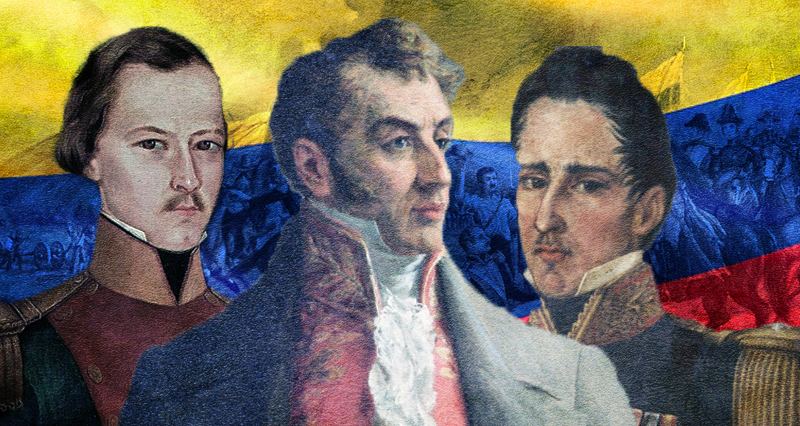Today’s Colombian politicians should learn from the history.
Today’s Colombian politicians should learn from the history.
By Sergio Rodriguez Gelfenstein
On September 30, 1813, after receiving reinforcements to shake off the siege of Puerto Cabello, the Spanish began an offensive towards Valencia. Colonel Atanasio Girardot was given the mission of containing the Goths, facing a Spanish column on the heights of Bárbula. During the effort of the battle, Girardot was hit by a rifle bullet when he tried to fix the Republican flag on the conquered height. Girardot was born in San Jerónimo, Antioquia, in the territory of present-day Colombia and died in Naguanagua, in the present-day state of Carabobo, Venezuela. He lived 22 years.
In February 1814, the confrontation between patriots and royalists reached a high level in the center of the country. Captain Antonio Ricaurte was appointed in charge of the weapons park located in the San Mateo estate owned by the Bolívar family. The Spanish managed to carry out a successful offensive that created the possibility of seizing the weapons stored in San Mateo. Ricaurte set fire to the gunpowder and made it explode on March 25, 1814, giving his life and those of a handful of heroes who guarded the compound. Ricaurte was born in Villa de Leyva, in the current department of Boyacá, Colombia and died in San Mateo, today the state of Aragua, Venezuela. He lived 27 years.
Antonio Nariño was born in Bogotá. He is, along with Francisco de Miranda, one of the precursors of American independence. In 1814 he was taken prisoner and stayed 6 years in the dungeons of the monarchy. After being released in 1820, he returned to America, not to Bogotá where Santander was, but to Angostura, Venezuela, from where he communicated with Bolívar. Knowing his background and career, the Liberator summoned him to meet in Apure when, after Boyacá and while the plans for what would be the victory in Carabobo were being drawn up, the installation of the Congress was simultaneously being prepared. Bolívar appointed him interim vice president of the Republic with the mission of installing the Constituent Congress.
He had to pay for his loyalty to Bolívar; the Santander oligarchy never stopped persecuting him. He defended himself legally and was acquitted of all the accusations that were falsely brought against him. But his health had deteriorated and he died in 1823 at the age of 58. He is one of the fathers of Colombia la grande and the father of Venezuela, even though he was not born here.
On December 9, 1824, José María Córdova was the commander of the 2nd Colombian Division in the fields of Ayacucho, Peru. The forces under his command had to resist the attacks of the main contingents of the Spanish army and, when General Sucre ordered him to go on the offensive, Córdova dismounted from his horse and, weapon in hand, placed himself at the front of his troops and incited them to begin the attack under the order: “Division, arms at will, head on, at the pace of victors!”
At the end of the battle, in recognition of his bravery and leadership, Sucre, without consulting the Liberator (who later endorsed the decision), promoted Córdova on the battlefield to the rank of Major General, removing his own epaulettes and placing them on his own shoulders. Córdova was born in Antioquia, New Granada (today Colombia). He was 25 years old. His boss, Antonio José de Sucre, from Cumaná, Venezuela, was 29. Together, boss and subordinate, brothers in combat and friends in life, one Colombian, the other Venezuelan, brought the glories of Boyacá and Carabobo to Junín and Ayacucho.
This is the history and glory of Colombia. 200 years later, the Colombian oligarchy has come to power: Pastranas, Uribes, Santos and Duques want to sink the history of struggle and brotherhood between our two peoples into infamy and dishonor. Like Santander, they continue to do the dirty work for the United States.
But the good Colombians, the millions of Girardot, Ricaurte, Nariño and Córdova are for Venezuela, sisters and brothers even though they separated us by the ignominy of 1830. They and we are children of Bolívar. The shame of 1828 when they tried to assassinate the Liberator and of 1830, when the oligarchies of Caracas and Bogotá shamefully reestablished the border line drawn by Spain, when Spain was no longer a power in America, has been repeated today when from the Dominican Republic, a pedophile ex-president wanted to impose by force what they have not been able to achieve by reason.
Another former president, failed and defeated, who after reaching the highest office riding on the forces of drug trafficking and paramilitarism, has attempted to give lessons in democracy, like the one he established in his country through the practice of false positives, the persecution of the people, the displacement of peasants and the surrender of the country’s sovereignty to the United States.
Pastrana, Santos, Uribe and Duque are not Colombia. They insult and offend its glory and its memory. Colombia is Girardot, Ricaurte, Nariño and Córdova. They, like Bolívar, Sucre, Anzoátegui and Urdaneta, are also our guide and our path. It does not matter where one is born, what matters is where one decides to die and they died for Colombia, the great one, created for all by the Liberator Simón Bolívar.
















Leave a Reply